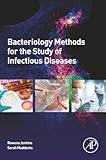Bacteriology methods for the study of infectious diseases / Rowena Jenkins, Department of Microbiology and Infectious Disease, Swansea University Medical School, Swansea University, UK, Sarah Maddocks, Department of Biomedical Sciences, Cardiff School of Sport and Health Sciences, Cardiff Metropolitan University, UK.
Material type: TextPublication details: United Kingdom Academic Press c2019Description: vii, 222 pages : illustrations (chiefly color) ; 23 cmISBN:
TextPublication details: United Kingdom Academic Press c2019Description: vii, 222 pages : illustrations (chiefly color) ; 23 cmISBN: - 9780128152225
- 0128152222
- QR46 .J45 2019
- 2020 A-088
- QW 25.5.B2
| Item type | Current library | Call number | Status | Date due | Barcode | |
|---|---|---|---|---|---|---|
 Books
Books
|
KMTC:LAKE VICTORIA CAMPUS General Stacks | QR46 .J45 2019 (Browse shelf(Opens below)) | Available | LVC/1193 |
Includes bibliographical references (pages 215-216) and index.
undamental skills for infectious disease research
Bacterial growth in solid and liquid media
Microscopy and staining
Antimicrobial testing
Cell culture-based infection models
Bacteriology Methods for the Study of Infectious Diseases provides knowledge, understanding and experience of contemporary, robust methodologies for studies into the pathogenicity and virulence of human/animal bacterial pathogens. This book presents contemporary, yet widely utilized methodologies, for the study of pathogenicity and virulence in bacterial pathogens of human and/or animal origin. Protocols are clearly outlined, with lists of required equipment and reagents, alongside underpinning theory. This text will provide undergraduate and postgraduate students with practical guidance for dissertation projects with protocols for individual project ideas that can be developed further, hence a starting point for additional literature searches is also provided. Helps users research dissertations and interdisciplinary research projects Presents a valuable resource that enables researchers from diverse backgrounds to undertake research within the field of infectious diseases Summarizes protocols that give a fundamental start to research, but are highly adaptable or can be built upon and integrated into other methodologiesProvides knowledge, understanding and experience of contemporary, robust methodologies for studies into the pathogenicity and virulence of human/animal bacterial pathogens"--EBSCO
There are no comments on this title.

